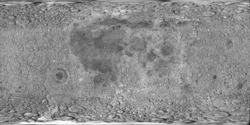Cratere Byrgius
cratere lunare
Byrgius è un cratere lunare di 84,46 km situato nella parte sud-occidentale della faccia visibile della Luna.
| Cratere Byrgius | |
|---|---|
| Tipo | Crater |
| Satellite naturale | Luna |
 | |
| Dati topografici | |
| Coordinate | 24°43′48″S 65°22′48″W / 24.73°S 65.38°W |
| Maglia | LQ-18 (in scala 1:2.500.000) LAC-92 Byrgius (in scala 1:1.000.000) |
| Diametro | 84,5 km |
| Localizzazione | |
Il cratere è dedicato all'astronomo svizzero Joost Bürgi.
Crateri correlati modifica
Alcuni crateri minori situati in prossimità di Byrgius sono convenzionalmente identificati, sulle mappe lunari, attraverso una lettera associata al nome.
| Byrgius | Coordinate | Diametro (in km) |
|---|---|---|
| A[1] | 24°33′00″S 63°48′36″W / 24.55°S 63.81°W | 18,45 |
| B[2] | 23°52′48″S 60°57′36″W / 23.88°S 60.96°W | 23,03 |
| D[3] | 24°04′48″S 67°16′48″W / 24.08°S 67.28°W | 27,06 |
| E[4] | 23°29′24″S 66°21′36″W / 23.49°S 66.36°W | 17,19 |
| H[5] | 23°45′36″S 62°36′00″W / 23.76°S 62.6°W | 21,33 |
| K[6] | 23°00′36″S 61°56′24″W / 23.01°S 61.94°W | 14,98 |
| N[7] | 22°23′24″S 63°09′36″W / 22.39°S 63.16°W | 22,85 |
| P[8] | 22°31′48″S 64°13′48″W / 22.53°S 64.23°W | 18,68 |
| R[9] | 26°30′S 60°51′W / 26.5°S 60.85°W | 7,18 |
| S[10] | 26°03′36″S 61°46′12″W / 26.06°S 61.77°W | 45,94 |
| T[11] | 25°03′36″S 61°36′00″W / 25.06°S 61.6°W | 4,74 |
| U[12] | 25°50′24″S 67°21′36″W / 25.84°S 67.36°W | 10,42 |
| V[13] | 26°04′12″S 67°54′00″W / 26.07°S 67.9°W | 8,74 |
| W[14] | 26°07′12″S 68°38′24″W / 26.12°S 68.64°W | 13,64 |
| X[15] | 25°44′24″S 65°33′00″W / 25.74°S 65.55°W | 5,9 |
Note modifica
- ^ (EN) Byrgius A, su Gazetteer of Planetary Nomenclature, United States Geological Survey. URL consultato il 18 giugno 2020.
- ^ (EN) Byrgius B, su Gazetteer of Planetary Nomenclature, United States Geological Survey. URL consultato il 18 giugno 2020.
- ^ (EN) Byrgius D, su Gazetteer of Planetary Nomenclature, United States Geological Survey. URL consultato il 18 giugno 2020.
- ^ (EN) Byrgius E, su Gazetteer of Planetary Nomenclature, United States Geological Survey. URL consultato il 18 giugno 2020.
- ^ (EN) Byrgius H, su Gazetteer of Planetary Nomenclature, United States Geological Survey. URL consultato il 18 giugno 2020.
- ^ (EN) Byrgius K, su Gazetteer of Planetary Nomenclature, United States Geological Survey. URL consultato il 18 giugno 2020.
- ^ (EN) Byrgius N, su Gazetteer of Planetary Nomenclature, United States Geological Survey. URL consultato il 18 giugno 2020.
- ^ (EN) Byrgius P, su Gazetteer of Planetary Nomenclature, United States Geological Survey. URL consultato il 18 giugno 2020.
- ^ (EN) Byrgius R, su Gazetteer of Planetary Nomenclature, United States Geological Survey. URL consultato il 18 giugno 2020.
- ^ (EN) Byrgius S, su Gazetteer of Planetary Nomenclature, United States Geological Survey. URL consultato il 18 giugno 2020.
- ^ (EN) Byrgius T, su Gazetteer of Planetary Nomenclature, United States Geological Survey. URL consultato il 18 giugno 2020.
- ^ (EN) Byrgius U, su Gazetteer of Planetary Nomenclature, United States Geological Survey. URL consultato il 18 giugno 2020.
- ^ (EN) Byrgius V, su Gazetteer of Planetary Nomenclature, United States Geological Survey. URL consultato il 18 giugno 2020.
- ^ (EN) Byrgius W, su Gazetteer of Planetary Nomenclature, United States Geological Survey. URL consultato il 18 giugno 2020.
- ^ (EN) Byrgius X, su Gazetteer of Planetary Nomenclature, United States Geological Survey. URL consultato il 18 giugno 2020.
Altri progetti modifica
- Wikimedia Commons contiene immagini o altri file sul Byrgius
Collegamenti esterni modifica
- (EN) Cratere Byrgius, su Gazetteer of Planetary Nomenclature, United States Geological Survey.
- (EN) Immagini del Cratere Byrgius, in Atlante fotografico orbitale della Luna, Lunar and Planetary Institute.
